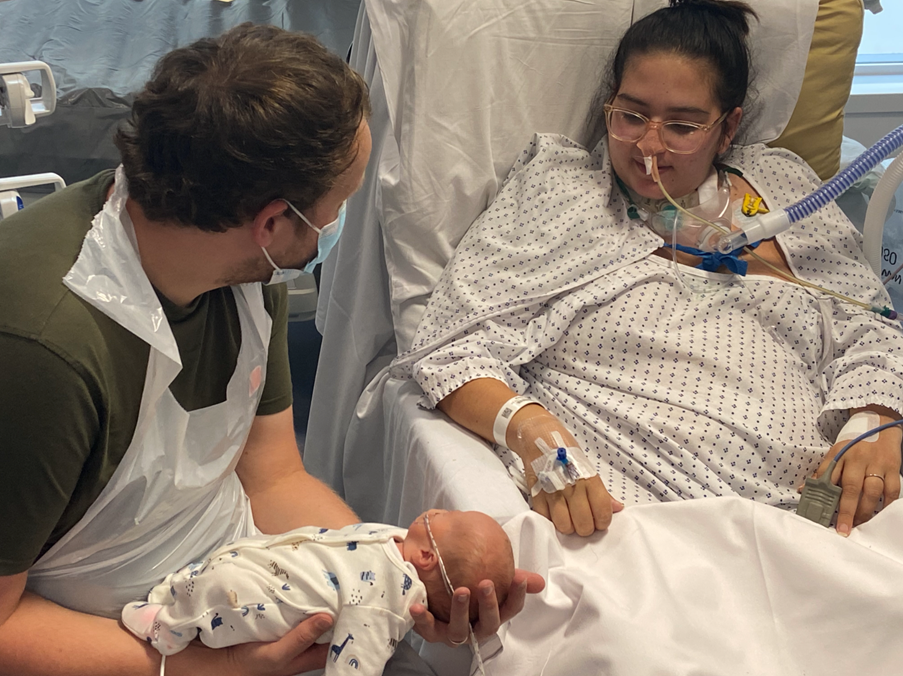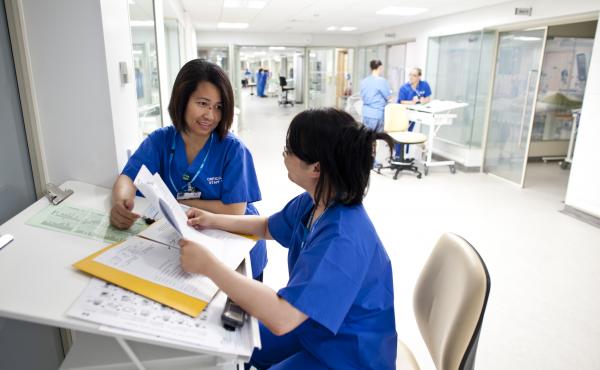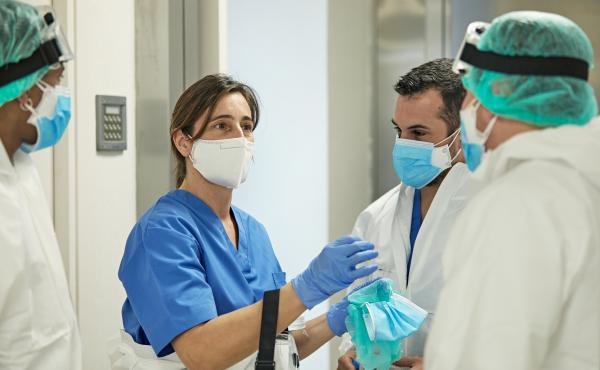Becoming a Mother Whilst Critically Ill – A Patient Experience

Cathy Ross is a Consultant in Intensive Care Medicine and Anaesthesia at Southmead Hospital in Bristol where she is the Lead Consultant for Maternal Critical Care. When not on the ICU she is most likely to be found running with her dog or entertaining her twin sons.
Those of us who have become parents know only too well that whilst a joyful time it can also be a turbulent, exhausting and emotional rollercoaster. To imagine navigating this huge life change whilst also experiencing a life-threatening illness and a critical care admission is almost impossible.
As part of a study day I organised on maternal critical care for ICM trainees in the Severn Deanery, I was keen for my colleagues and I to have an insight into the patient experience and was incredibly lucky to be put in touch with Chelsie King. Chelsie was 25 weeks pregnant in July 2020 when she became unwell with Covid-19 and required admission to ICU for invasive ventilation and later ECMO. She generously agreed to a live interview with me during our study day and her powerful testimony was incredibly moving and a highlight of the day for many of us. With Chelsie’s permission, I now use recordings of the interview for educational purposes with ICU doctors of all grades, Critical Care Outreach Practitioners and ICU nurses around the South West of England. Whilst Chelsie’s words describe her unique experience, they do elegantly illustrate some common themes which are reflected in the literature around women’s experience of admission to ICU during their pregnancy or after the birth of their child.
Being admitted to ICU
Chelsie was pregnant with her first baby when she developed Covid and was admitted to the Bristol Royal Infirmary ICU where she deteriorated on CPAP. A decision was made to undertake an emergency caesarean section under general anaesthesia and after the birth of her son Rafael she remained on ICU sedated and ventilated for 10 days. When she deteriorated further, she underwent ECMO cannulation and was transferred to St Thomas’s Hospital in London. She received 19 days of ECMO therapy and was tracheostomised. She describes her first memories of waking up in London:
“I just had really bad delirium… when I went up to London they didn’t take my glasses… so I couldn’t see anything”
“…but I’d forgotten that I was pregnant and I didn’t even know I’d had a baby and they had to keep reminding me… …it was just very surreal”
This echoes the experience of many women – critical illness in pregnancy often evolves very rapidly and women who wake on the ICU are often profoundly shocked, distressed and disorientated with little recollection of events and need support and reassurance as to what has happened to cause their admission. 1,2
Being separated from your baby
Whilst Chelsie was in St Thomas’s her son was being cared for on the NICU in St Michael’s Hospital in Bristol and she was only able to see photos of her son during this time. She remembers a video call with a close relative during her last few days in London:
“…and my nan said ‘Rafael is 5 weeks old’… and I don’t know if anyone had told me that at that point or they had but I just didn’t remember… and I sort of looked at my nurse very worried and strangely and she did say ‘yes, he’s 5 weeks old’ and I was like, ‘what?’ I had not realised that time had passed...”
Once Chelsie returned to Bristol, she was finally able to meet her son:
“It took another five days for them to work out the logistics because the maternity hospital is a separate hospital and it was deemed that he was more stable than me so he would be brought to me. And so, on the 21st of August, that was the first time I met him”
“I was really nervous, I was worried, I’d seen pictures… and I was just worried my baby wasn’t going to know who I was…”
Due to Covid restrictions Rafael had been unable to have any visitors for the first ten days of his life but happily Chelsie’s husband had bonded with his son despite this. Chelsie was frightened this might not be possible for her and Rafael.
“He was wheeled in on a very, very big transport cot and I was just nervous, shaking, feeling strange and very emotional… and he was placed on me… and he settled instantly and it was like this instant feeling that everything was going to be okay, and um, that I was his Mum and nothing would change that…”
“But that point was the turning point in how I felt and it gave me the motivation to get better and to try really hard at everything: at what the physios threw at me, at coming off the ventilator, at sitting out in the chair… all I wanted to do was to get better so I could be with him…”
“Over two weeks they managed to bring him over five times which was really amazing… and I definitely wouldn’t have recovered as fast as I did if I hadn’t been able to see him…”
Again, in a qualitative interview based study women describe the pain of being separated from their newborn and though photographs of their baby are welcomed the need to be present with their child is powerfully felt. The sadness of missing first feeds and other moments is frequently described.1 Chelsie’s testimony demonstrates the benefit of facilitating visits between women and their baby as being positive not only for women’s psychological and emotional wellbeing but also their physical rehabilitation.
Bonding with your baby
When I asked Chelsie about something the ICU team did particularly well, she described the actions of one of her nurses:
“One of my ICU nurses was so lovely, she gave me scent squares and I would wear one and then my husband would take it to the baby and we would swap every day and that was really special… and I felt that was really important, that we could smell each other…”
When women and their babies are separated making the effort to facilitate visits and skin to skin time whenever possible is hugely meaningful. Even when this is not possible the use of paired muslin cloths or soft toys that can be exchanged between mother in baby during periods of separation is an easy way to promote a sense of closeness.
Breastfeeding
Chelsie had planned to breastfeed her son before she became unwell and talked about her feelings around this:
“So obviously I wanted to breastfeed and that wasn’t an option. I did find out a year later that I had been asked by the midwife just before I went under if she could hand express to get any colostrum to give to the baby and I said yes. And that gave me some satisfaction, some comfort that they were able to do that…and give that to him as his first taste of milk and that it did come from me even though I wasn’t able to do it myself”
“…and I wish someone had told me – I know it’s a small intricate detail but it made me feel a lot better to know that I had given him that…”
Not all women plan to breastfeed but the importance of ensuring that these women are not deprived of the choice on how to feed their babies is key. If women are keen to breastfeed this can often be supported with the use of hand expression and pumping, even under sedation. Many commonly used ICU drugs are safe in breastfeeding and when they are not and the milk obtained needs to be discarded the act of pumping can establish and maintain milk supply for when women are recovering from their illness.
Recovery and Step Down from ICU
Chelsie is now in touch with a group of women like her who were ventilated during pregnancy with Covid pneumonitis, not all underwent ECMO but several others did.
“Some of them got diaries that the ICU kept for them…and that’s something I feel would be really important because those are memories you don’t necessarily remember and that gap from when my son was born to when I went to St Thomas’s still haunts me. And my husband doesn’t remember because our son had just been born and he was a wreck…it feels like a gap, like a black hole where I just don’t know what happened… Do I think a diary would have helped me mentally? Yes, I think it would have”
Many women feel traumatised by their admission to ICU and can struggle when stepping down to the maternity ward.1 Critical Care Outreach teams can ease this transition and many women may benefit from diaries of their time in Critical Care as well as both birth trauma debriefs and ICU follow up to help them make sense of their experiences.
Reflecting on her experience
“If I had to go through everything I did to get the son I have today then I would in a heartbeat because he is so perfect, and he is just everything and I love him so much and what we’ve been through together…. I think we’re both miracles!”
In summary, multi-collegiate guidance is clear that women who become critically ill in pregnancy should not only receive the same excellent standard of intensive care as their non-pregnant counterparts but also that they should have their maternal needs met to as high a standard on the general ICU as they would in a maternity setting.2 As intensivists we must be mindful of the psychological and emotional impact of a critical care admission for our maternity patients and strive to provide excellent and holistic multidisciplinary care during their time with us.
An update from Chelsie:
Both she and Raf are doing really well and he will start primary school in September. He continues to amaze his family every day and whilst Chelsie has some ongoing cardio-respiratory follow up needed she is also thriving, doing well at work and continuing to share her story and advocate for women like her.
References
1. Maternal critical care: what can we learn from patient experience? A qualitative study
Hinton L, Locock L, Knight M BMJ Open 2015: 5e006676 doi:10.1136/bmjopen-2014-006676
Accessed 5th May 2025
2. Care of Critically Ill Women in Childbirth
https://www.rcoa.ac.uk/sites/default/files/documents/2020-06/EMC-Guidelines2018.pdf





